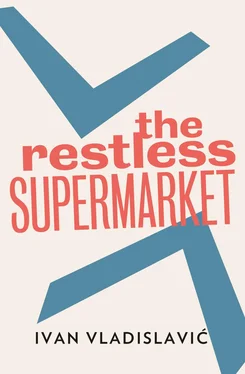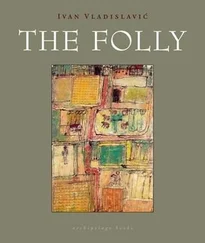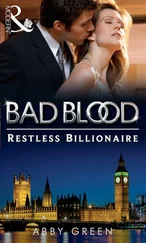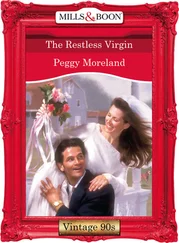Ivan Vladislavić - The Restless Supermarket
Здесь есть возможность читать онлайн «Ivan Vladislavić - The Restless Supermarket» весь текст электронной книги совершенно бесплатно (целиком полную версию без сокращений). В некоторых случаях можно слушать аудио, скачать через торрент в формате fb2 и присутствует краткое содержание. Год выпуска: 2014, Издательство: And Other Stories Publishing, Жанр: Современная проза, на английском языке. Описание произведения, (предисловие) а так же отзывы посетителей доступны на портале библиотеки ЛибКат.
- Название:The Restless Supermarket
- Автор:
- Издательство:And Other Stories Publishing
- Жанр:
- Год:2014
- ISBN:нет данных
- Рейтинг книги:4 / 5. Голосов: 1
-
Избранное:Добавить в избранное
- Отзывы:
-
Ваша оценка:
- 80
- 1
- 2
- 3
- 4
- 5
The Restless Supermarket: краткое содержание, описание и аннотация
Предлагаем к чтению аннотацию, описание, краткое содержание или предисловие (зависит от того, что написал сам автор книги «The Restless Supermarket»). Если вы не нашли необходимую информацию о книге — напишите в комментариях, мы постараемся отыскать её.
It is 1993, and Aubrey Tearle's world is shutting down. He has recently retired from a lifetime of proofreading telephone directories. His favorite neighborhood haunt in Johannesburg, the Café Europa, is about to close its doors; the familiar old South Africa is already gone. Standards, he grumbles, are in decline, so bad-tempered, conservative Tearle embarks on a grandiose plan to enlighten his fellow citizens. The results are disastrous, hilarious, and poignant.
Ivan Vladislavic
The Restless Supermarket — читать онлайн бесплатно полную книгу (весь текст) целиком
Ниже представлен текст книги, разбитый по страницам. Система сохранения места последней прочитанной страницы, позволяет с удобством читать онлайн бесплатно книгу «The Restless Supermarket», без необходимости каждый раз заново искать на чём Вы остановились. Поставьте закладку, и сможете в любой момент перейти на страницу, на которой закончили чтение.
Интервал:
Закладка:
Fun. That more familiar three-letter word warned me what was really behind all this. But a train of thought was already puffing down my one-track mind. I had recognized long before that my exempla needed to be embodied in sentences in order to capture the proofreader’s true function and inculcate his habits of mind. Perhaps I hadn’t gone far enough. If sentences were good, why shouldn’t paragraphs be better? One of the great problems of proofreading was precisely the tension between momentum and inertia. The story was a horse that wished to bolt, and the unwary or unpractised proofreader might find himself thrown and dragged behind its flashing hooves.
But the wicked Bibles and lying dictionaries cautioned me.
‘It’s possible, a story of some kind, with all my corrigenda, my “things to be corrected” woven into it. But where will I put the correct versions, my “things corrected”? Weaving them in too will be an impossible task. It will spoil the story.’
‘Leave them out. Make it more interesting for whoever reads it. That will be the fun of it, as always: inventing order. Not extracting it, mind you, like a lemon-squeezer, but creating it.’
‘Leave them out! What if it falls into the wrong hands? Some story full of contrived errors could wreak havoc among the impressionable.’ A ticklish sensation crept over my skull at the thought: the follicles puckering, trying to make the vanished hair stand on end.
‘Forgive me,’ said Merle, ‘but isn’t this exactly what you spend your life doing — hunting for errors? Why deny others the pleasure?’
‘My corrigenda are accidents of carelessness or ignorance, designated as such, and held up for scrutiny. The perpetrators had no evil intent. What you are proposing would be premeditated. And in such fatal concentrations. It scares me. In any event, I’m a professional.’
‘It won’t be for greenhorns.’ She seized my writing hand, with the pencil still in it, and squeezed it till it hurt. Thankfully it wasn’t my left hand, my thumbing hand as I think of it: the bones of that, and the thumb-bones in particular, have been weakened by a lifetime of thumbing through. ‘It will be for the amateur, in the best sense of the word, for those who are already in the know — or like to think they are. It will preach to the converted and renew their faith. It will be sent to try them. It will be a test of skill for the whole clan of proofreaders — prospective, practising and pensioned-off. It will further the aims of your noble profession.’
And with that, ‘The Proofreader’s Derby’ — although I still hadn’t dubbed it that — was born.
*
When I think of those times now (casting some shadows from my mind), they are dappled with daylight sifted through the north-facing windows of the Café Europa. Like gold dust blown in off the dumps. My golden days, caesar salad days, days of whiskey and roses. All in all, a moisturizing season, with the sap rising in dusty veins and the juices in the grey matter trickling.
Four people around a table. A round table. No. 2. We got to know one another a little, and to like one another to the same modest extent. There was not much depth to our association. I acknowledge it freely. I can scarcely recall a conversation now that could not be plumbed with a teaspoon or a swizzlestick, depending on one’s preference. But it was stable, reliable, secure — qualities some of us only came to appreciate fully after we had been overwhelmed by flimsy, crooked things. In my day, solidity was a virtue. Yet all around, the cry goes up for transparency, as if the capacity to be seen through were laudable, as if a house were better made of glass than stone.
The Records grew in leaps and bounds. There were now four people clipping items from newspapers and magazines, jotting down scraps from shop windows or advertising flyers. None of them had my practised eye, of course, but Spilkin came up with some gems. Even Mevrouw Bonsma made some well-meaning contributions from sheet music and knitting patterns — notably that old chestnut, ‘knit one, pearl one’. Soon I was spending half an hour a day cataloguing the new acquisitions.
Every other waking moment was devoted to transforming the System of Records into the Proofreader’s Test.
I am an accomplished composer of letters to the press, as I hope I have demonstrated, and an expert curator of lists, ditto. But the Test was a new departure for me. I came to regard it as in essence fanciful. I had very little experience as a consumer of fancies and none whatsoever as a producer, but that is exactly what seemed to be required. Although my ‘raw material’, as Merle encouraged me to think of it — the phrase never ceased to remind me of meat — had all been culled from published, or at the least, public sources, I was now required to place the elements into entirely new and undeniably imaginary relationships with one another. Imaginary relationships … I was like a man who, never having held a needle between his fingers, is given some mismatched offcuts, a fistful of gauds and ribbons, a few skeins of thread, and commanded to make himself a suit of clothes.
I took my cue from Merle, laying sentences side by side, building up paragraphs incrementally, nudging those into groups or ‘fascicles’, as I called them, allowing the Test to shape itself anyhow. I found that this patchworking obliged me to begin inventing as well. When a sentence wasn’t quite the right shape, I had to lop off a bit here or add on a bit there, cutting my cloth to suit the pattern − not my pattern, but its own. This was fancy, pure and simple, and so antithetical to my usual way of working, which consists of a precise and considered re-establishment of the disturbed order, that I frequently lost my nerve and wished to throw the whole project over. I forged myself a golden rule: the corrigenda themselves, the tesserae that formed the substance of the Test, could not be invented. The plaster (and I did seem to require quite a bit of it) mattered less. I took comfort in the thought that the laws that governed my seemingly random activities were bound to become apparent as I went along. In other words, I trusted that this detour through the thickets of invention would bring me back, wiser and happier, to the manicured lawns of the given.
For quite some time now, I have been inclined, looking back, to think that this is exactly what happened. But just lately, new doubts have beset me. Perhaps I shall never walk in that garden again?
Merle became my inspiration. I tried out sentences on her occasionally, as they took shape, but I always baulked at a paragraph. And naturally the finished material was kept from the others. Mevrouw Bonsma was relieved, I think. Spilkin, on the other hand, was always looking over my shoulder and winking so deliberately you’d have thought he was trying to demonstrate the musculature of the eye. It got to the point where I had to carry my confidential papers with me to the Gentlemen’s room to answer the call of nature.
As the months passed, the Test’s purpose became clearer to me, even if the laws of its composition did not. I began to see it as the centrepiece of an event, a championship if you like. When the Test was finished, and I had no inkling when that might be, it would be administered . There would be entrants, and they would pay a fee, and the one with the best results would receive a prize. A dictionary might be apt; say the seventh edition of the Concise — something newly revised would appeal to the youngsters — paid for out of the entry monies. I would have to decide on the winner myself. Merle’s notion that the Test be allowed to enter the world without correction was indefensible. I would prepare a corrected version, and hold it back until such time as the Test had been administered, so that everyone might have the ‘fun’ that meant so much to them. But then the corrected version would be made available too, as an antidote and an objective corroboration of my adjudication. If the inaugural event had to be delayed, well, so be it. It was essential, at any rate, that I myself adjudicate, that I retain control at least in the beginning. Later on, should the event become too popular for one person to manage, I might consider employing an administrator. Start small, I told myself. But how small was that? How many people would be interested in entering a proofreading competition? It would depend, among other things, on how well it was publicized. Would one advertise in the papers? What if people responded in ‘droves’, as the drudges put it? Who would foot the bill for a venue and for duplicating copies of the Test itself? Then again, if the entry fees were fixed at the right level, the whole undertaking might become profitable and eke out my pension. While these thoughts went round in my head, the Test continued to grow, and with it, my grand plans for the inaugural competition. Think big, I told myself. Instead of a dozen boozy subeditors cooped up in the ping-pong room at the Hillbrow Recreation Centre, why not the cream of the publishing world, possibly a few international figures — hardly celebrities, but prominent people, a Hugh Blythorne, a Dr Kate Babcock (if she was still with us) — all comfortably settled in the Selborne Hall? Competing not for a used copy of Peter Mark Roget’s Thesaurus , but for the Oxford English Dictionary in twenty volumes. The Proofreader of the Year Competition. The Aubrey Tearle Proofreader of the Year Competition. The First Annual etcetera.
Читать дальшеИнтервал:
Закладка:
Похожие книги на «The Restless Supermarket»
Представляем Вашему вниманию похожие книги на «The Restless Supermarket» списком для выбора. Мы отобрали схожую по названию и смыслу литературу в надежде предоставить читателям больше вариантов отыскать новые, интересные, ещё непрочитанные произведения.
Обсуждение, отзывы о книге «The Restless Supermarket» и просто собственные мнения читателей. Оставьте ваши комментарии, напишите, что Вы думаете о произведении, его смысле или главных героях. Укажите что конкретно понравилось, а что нет, и почему Вы так считаете.












